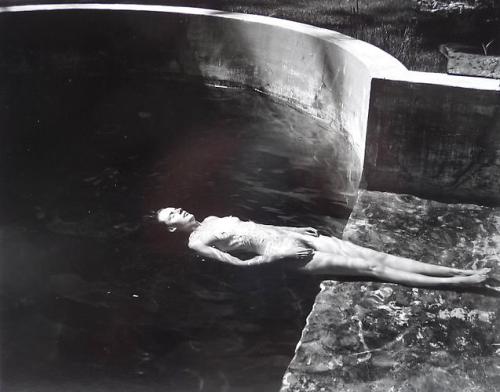
“NUDE, FLOATING, 1939” by Edward Weston.
From: Weston’s Westons
Danziger Projects, NYC
via fine nudes on tumblr

“NUDE, FLOATING, 1939” by Edward Weston.
From: Weston’s Westons
Danziger Projects, NYC
via fine nudes on tumblr

Photothèque imaginaire de Shuji Terayama, les gens de la famille Chien Dieu - Terayama Shuji (1935-1983)via UbuWeb
via fine nudes on tumblr
Gitterman Gallery is proud to present an exhibition of vintage black and white photographs by Ferenc Berko.
Ferenc Berkó (1916-2000) is part of long tradition of Hungarian émigré photographers, which includes Brassaï, Robert Capa, André Kertész, László Moholy-Nagy and Martin Munkásci. Influenced by some of the great Bauhaus teachers at a young age, Berko explored numerous genres and various styles. Within every period of his career, his work was concurrent with the artistic developments of the time. This is the first exhibition from Berko's estate and is a partial survey of his black and white work from the 1930s through the early 1950s. Subsequent shows will highlight his innovations in color and his deep interest in nature.
Ferenc Berko was born to a Jewish family in Hungary in 1916. Following his mother's death in 1921, Berko moved with his father and his sister to Dresden, Germany. At the age of twelve, with his father's health deteriorating, Berko was adopted by a family in Berlin. His foster parents gave Berko his first camera and encouraged his creative pursuits. His foster mother, in particular, was a patron of the arts and many well respected modernist figures at the time, like Walter Gropius, Marcel Breuer, and László Moholy-Nagy, would often visit their home. Berko was especially influenced by Moholy-Nagy, who became a friend and mentor.
In 1933, with the growth of anti-Semitism in Germany, Berko was sent to England to finish his studies in philosophy. While in London, he became active in the photography and film circles and met Emil Otto Hoppé, who became a mentor. Following school, Berko moved to Paris where he continued to collaborate with his wife Mirte on a series of nude photographs. In 1937 he made a trip back to Hungary and photographed Jews in Budapest. In 1938, with Nazi influence on the rise, Berko moved to India to become a filmmaker. Beyond learning cinematography, he experimented with the photographic process, creating photograms as well as prints with multiple negatives, while at the same time continuing his passion for investigating the world through an eye for beauty and form.
Moholy-Nagy invited Berko to teach photography and film at the New Bauhaus, the Institute of Design in Chicago. Unfortunately, Moholy-Nagy died just before Berko arrived in 1947. Berko's work in Chicago focused on the abstraction of the urban landscape, continuing his interest in modernism, while developing work that had a direct dialogue with the current developments of Abstract Expressionism.
In 1948, the Berkos' close friend in Chicago, Walter Paepcke, an industrialist and patron of the Institute of Design, invited them to visit Aspen in hopes they would make it home. Initially, the Berkos turned down the offer and returned to London in hopes of regaining their former life. Dismayed with post war London, Berko moved to Aspen in 1949 as the official photographer for the Goethe Bicentennial and then the Aspen Institute and Aspen Music Festival and School. In Aspen, Berko's visual and intellectual palettes were nourished; he had finally found a place where he felt both respected and inspired.
Berko's work has been collected by the Bibliothèque Nationale, Paris; Center for Creative Photography, Tucson; International Center of Photography, New York; Musée d'Elysée, Lausanne; Museum of Modern Art, New York; the Metropolitan Museum of Art, New York; and Museum Ludwig, Cologne. Near the end of his life, "60 Years of Photography: The Discovering Eye" (Edition Stemmle, 1995) and "Berko: Photographs" (Graphis, 1999) were published.
via fine nudes on tumblr

When Johanna agreed to shoot with me it was under one condition; I was not to try to hide or cover up the fact that she had recently given birth.
In her first e-mail to me she wrote, "There has been a lot of attention given to photograhing pregnant women lately, but not post partum women ( at least not specifically post-partum). I think it would be interesting, it's not something you generally get to see."